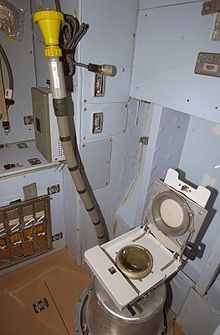
zero gravity toilet on the International Space Station (Wikipedia)
To really cause suffering in human beings, force them to do "number one" or "number two" in unsanitary and public circumstances. Things must have been more casual in earlier times. Imagine what it must have been like for medieval armored knights in the Crusades suffering with diarrhea, common, after all, in foreign lands. Were they rushing to and fro seeking a bit of concealment as the battle was about to get underway? Did they just use their suits? Who took care of that laundry job?
And on those treks across the featureless, treeless prairies, how did folks in long wagon trains manage? Many cultures through much of our history and pre-history must have been far more practical about such things. What did Londoners do, for instance, before there were even outhouses? Or sewers, for that matter? The Thames is said to have stunk year round. Yet what of the streets? Surely nobody had leisure, space, or wealth enough for his or her own inside plumbing, and, besides, where would it have led?
 zero gravity toilet on the International Space Station (Wikipedia) |
Anything that is kind of improper seems to have a peculiar fascination. Adults may not want to admit it, but children typically get into this sort of thing in a big way. And some of us never grow up. Yesterday, I had a dental appointment but needed the co-ed facilities just beforehand. After a nicely dressed older gentleman had come out, I was surprised to find that, though the toilet seat was down, it was covered with urine. The yellow liquid was also splattered on the floor on both sides of the receptacle. What sort of upbringing had this fellow had?
When I ran a vocational rehabilitation office in Orange, TX, we had a separate water closet for our secretary, just as well since invariably by the end of the day the public facility looked and smelled like one of those old phone booths in a rundown part of a big city where lots of street people hung out.
I cannot recall my first experiences with either diapers or bathrooms. I do, though, remember irritation and embarrassment at around age three when a new babysitter felt it necessary to watch from the doorway to be sure I correctly did what I had to (presumably without leaving yellow splashes on or around the commode).
Early learning curve experiences with how and where to deliver one's pee or poop can be interesting. Despite our larger brains, people seem to catch on a lot less quickly than pups in this regard. When my next younger brother was asked to help his next younger brother get his shorts down for an urgent release into the toilet, the little guy hardly had himself exposed but a hot steam arced upward, hitting his helper in the eye.
Later, much to my young sister's chagrin, our family (of one girl and seven boys) had a bathroom with two toilets side-by-side. My siblings were expected to learn by doing in front of one another.
I do recall one of my first encounters with an outhouse. I was maybe four or five and visiting in Waco with my maternal grandmother. Her place was stark. It had a single inside faucet and metal sink, as I remember, and little else. The outhouse had a wooden board with a hole big enough for me to slip through if I were not careful. The smell was impressive. So were the flies. Even more exciting was a mantis on one of the wooden sides of this little shack, evidently waiting (and praying?) for a big fly to come within quick reach.
In the military, one learns to use entrenching tools to dig convenient holes or deeper, longer ditches for short-term private or longer-term public excretions. A little paper can be used when handy. Otherwise, if one is lucky leaves will suffice.
In my college years, I worked for awhile on a locked male psychiatric and medical ward, a harrowing place. Besides the combination of psychoses and often terminal illnesses there, a reason this seemed one of the levels of hell was that the men usually did not have a chance to go to the toilet, even if they might have been physically and mentally capable of doing so. Instead, they were forced to have catheters that connected their bladders to tubes and thence to big bottles that filled up on the floor. Their feces was cleaned up by orderlies when they got around to it.
There have been worse shitting and pissing places, of course, for instance communal arrangements with neither washing nor concealment means in Auschwitz-Birkenau during the Holocaust.
Sometimes, hygienic traditions are provided for but in ways westerners might find less than ideal. When I flew to India, we had a stop in Karachi, Pakistan, and, under military guard, were allowed a few minutes off the plane to buy warm Cokes or go to the toilet. No Charmin was provided, but for a tip a gentleman was ready to assist with a cold wet wash rag. I decided to wait awhile longer.
Both men and women go (no pun intended) into space now, but the costs for separate facilities must be prohibitive. Once there, weightlessness prevails, so the ordinary physics of Earthbound eliminative activities is problematic.
The more I think about the alternatives, the more appreciative I am for water conserving indoor flush toilets that I can access in private just when I need them and with at least a few squares of soft tissue at hand!
Primary Sources:
-If You Want to Teach Kids History, Try Grossing Them Out (an interview with author Sarah Albee). NPR Staff on Morning Edition; May 19, 2014;
-Evolution of Sewage Treatment. Onsite Wastewater Demonstration Project in Northern Arizona University College of Engineering, Forestry, and Natural Sciences; last updated in 2000;
-Night Soil. Wikipedia; last updated 3/17/2014.